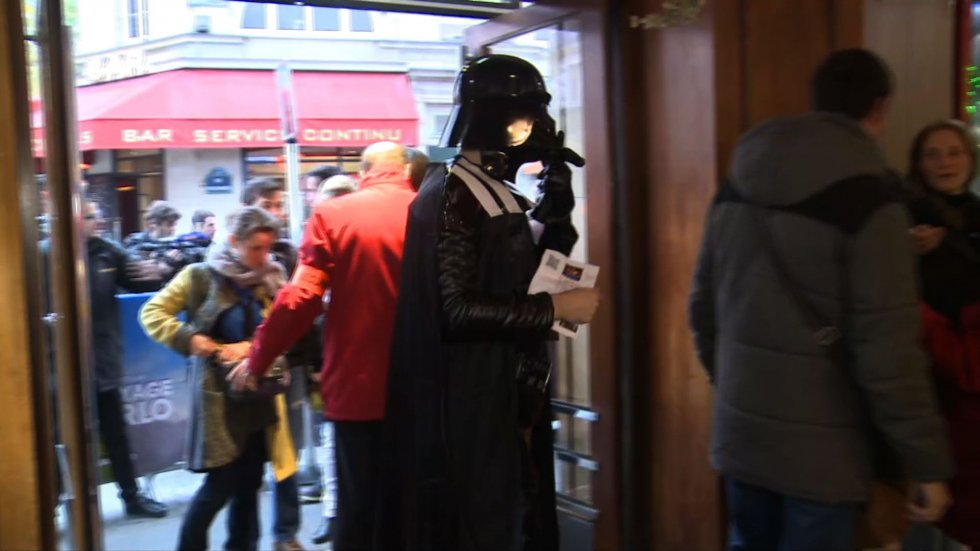Covering the obscure side of the awakening force
Paris, December 18, 2015 -- What was it like to be among the first people in the world to see the new Star Wars film? For this Paris-based cinema reporter, witnessing the mega secret campaign ahead of Disney’s eagerly-awaited release felt like accomplishing a mission of galactic proportions.
As for nearly all films, the release of the seventh installment in the popular saga -- on December 16 in certain European countries and on December 18 in the US -- was preceded by screenings for VIPs and the press.
What set the Star Wars screenings apart were the the draconian, never-before-seen conditions that Disney imposed on the media to prevent them from revealing details of the film before its general release.
 (AFP Graphics)
(AFP Graphics)The world premiere took place in Hollywood for 5,000 lucky people chosen by draw along with stars and celebrities. My Los Angeles-based colleague Veronique Dupont was among the journalists attending the premiere. These lucky few do not have the right to write anything about the plot.
The film’s Paris press showing, a day ahead of the general release, is a scenario more in line with a spy film than an intergalactic saga.
 A storm trooper ice sculpture in Liege, Belgium. (AFP / John Thys)
A storm trooper ice sculpture in Liege, Belgium. (AFP / John Thys)At the start of December, I receive an enigmatic email from a certain “Star Wars,” inviting me to an “exceptional showing” that will allow me to “count myself among the first people not only in France but in the entire world, to discover this eagerly awaited film.”
The email doesn’t self-destruct in 10 seconds. But I am asked to sign a confidentiality agreement in which I promise not to reveal the plot or the links between the characters, in order not to spoil the surprise for paying film-goers. I also have to promise not to publish a review before Wednesday, December 16 at 9:01. Any violation of the agreement will be taken seriously and could lead to legal action, warns the email.

"Captain Phasma" at a party in downtown Rome on the eve of the film's premiere. (AFP/Filippo Monteforte)
Embargos on film reviews are not a rare occurrence for big American productions. But these restrictions made many reporters grumble.
Still, to get in, I have to sign. Once I do so, I receive a code, my personal, non-transferable key on my cell phone that I will need to enter the screening. I know that the screening will take place on Tuesday. But the exact hour and the place will only be revealed the day before, by SMS, to the 300 journalists invited to the event. Another mystery. Usually film screenings in France take place several days, sometimes even weeks, ahead of the release, and the hour and place of the screening are known well ahead of time.
Around 3:00 pm on Monday the coveted SMS bings on my phone. We finally know what time we’ll be watching the film the next day. Place? Waaaay outside central Paris.
 Sabers at the ready ahead of the premiere in Paris. (AFP / Eric Feferberg)
Sabers at the ready ahead of the premiere in Paris. (AFP / Eric Feferberg)When I and the other journalists gather at the appointed hour in front of the venue, many of us are under the impression of covering something big, grand, much more important than a movie premiere. The doors open an hour ahead of the start of the screening. We are asked for our codes and our IDs. Security guards scrupulously examine our bags. Others confiscate our cell phones, placing them in paper envelopes that are then sealed. The cells will remain there for the duration of the screening.
Ahead of the premiere, Disney warned us that cell phones would not be permitted in the screening and that security agents equipped with night-vision equipment will be scanning the room on the lookout for any infractions. The advance materials that usually accompany film premieres are absent this time. All this so that film goers can watch the movie free of any prejudices, we are told again and again.
Having gone through all the security measures, the exhausted journalists can at last enter the coveted room. Some more agonizing minutes pass…. and the film starts, accompanied by John Williams’ mythical music.

Click here to watch on a mobile device.
As we watch the film, we notice shadows lurking here and there on the sidelines of the screening room -- the security agents on the prowl for smuggled phones or cameras.
After two and a half hours, the reporters leave this most unusual screening. What to think of “Star Wars: The Force Awakens?” The seventh installment will not disappoint fans of the cult series. And the journalist covering this event? She can go back to her office with the feeling that she has accomplished an incredible mission in a galaxy far, far away. When in reality she simply saw a movie.
Sophie Laubie covers cinema for AFP in Paris. Follow her on Twitter.
This blog was translated by Yana Dlugy. Read the original in French here.
 Cleaning up in front of an ad in Hong Kong. (AFP / Anthony Wallace)
Cleaning up in front of an ad in Hong Kong. (AFP / Anthony Wallace)

